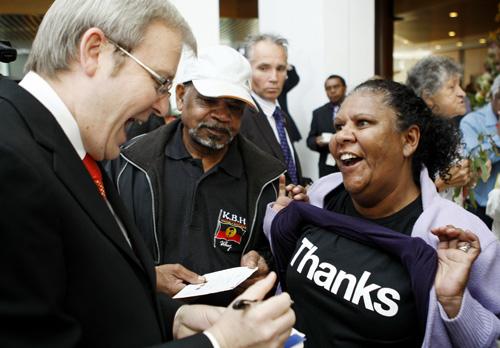Australian Parliament provides apology to indigenous people

Australian Prime Minister Kevin Rudd, left, signs a autograph for a Aboriginal woman after delivering a speech where he apologized to its indigenous people for past treatment that “inflicted profound grief, suffering and loss,” in a historic parliamentary Mark Baker, The Associated Press
Feb 13, 2008
Last updated on May 12, 2016 at 09:26 p.m.
CANBERRA, Australia – Aborigines organized breakfast barbecues in the Outback, giant TV screens went up in state capitals, and schools allowed students to watch the telecast of Australia’s apology Wednesday for policies that degraded its indigenous people.
In a historic parliamentary vote that supporters said would open a new chapter in race relations, lawmakers unanimously adopted Prime Minister Kevin Rudd’s motion to on behalf of all Australians.
Aborigines remain the country’s poorest and most disadvantaged group, and Rudd has made improving their lives one of his government’s top priorities.
As part of that campaign, Aborigines were invited for the first time to give a traditional welcome Tuesday at the official opening of the Parliament session – symbolic recognition that the land on which the capital was built was taken from Aborigines without compensation.
Get The Daily Illini in your inbox!
The apology is directed at tens of thousands of Aborigines who were forcibly taken from their families as children under now abandoned assimilation policies.
“We apologize for the laws and policies of successive parliaments and governments that have inflicted profound grief, suffering and loss on these our fellow Australians,” the apology motion says.
“To the mothers and the fathers, the brothers and the sisters, for the breaking up of families and communities, we say sorry.”
“And for the indignity and degradation thus inflicted on a proud people and a proud culture, we say sorry.”
The apology ends years of divisive debate and a decade of refusals by the previous conservative government that lost November’s elections.
It places Australia among a handful of nations that have offered official apologies to oppressed minorities, including Canada’s 1998 apology to its native peoples, South Africa’s 1992 expression of regret for apartheid and the U.S. Congress’ 1988 law apologizing to Japanese-Americans for their internment during World War II.
The reading of Australia’s apology and the parliamentary vote was broadcast nationally, and people across the country watched, from the Outback breakfasts to the school assemblies.
Giant television screens were erected outside Parliament House in Canberra for hundreds of people who could not fit inside. Screens were also set up in parks and other public places in Sydney and other state capitals.
The measure offered “a new page in the history of our great continent” and “a future where this Parliament resolves that the injustices of the past must never, never happen again.”
In a speech urging lawmakers to support the motion, Rudd also offered an apology on behalf of the government. “As prime minister of Australia, I am sorry,” he said. “On behalf of the government of Australia, I am sorry. … I offer you this apology without qualification.”
Rudd received a standing ovation from lawmakers and from scores of Aborigines and other dignitaries who were invited to Parliament to witness the event. Many wiped away tears as Rudd spoke.
Rudd ruled out compensation – a stance that helped secure support for the apology among the many Australians who believe they should not be held responsible for past policies, no matter how flawed.
He pledges instead to lift the living standards of all Aborigines, and on Tuesday outlined bold targets for cutting infant mortality, illiteracy and early death rates among indigenous people within a decade.





